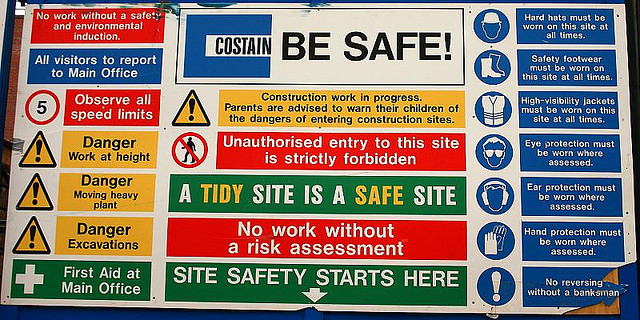The Fair Labor Standards Act (FLSA) was first enacted in 1938, to ensure “fair pay” for American workers. Sixty-five years later, it is invoked most often when minimum wage and overtime premium pay are under discussion. But it also includes a number of important secondary provisions—including one requiring employers and employees to determine which time at the workplace is considered “work” that must be compensated, and which is not.
Audit, Compliance and Risk Blog
Employment Law: Supreme Court Affirms No Pay To Change Clothes
Posted by Jon Elliott on Thu, Feb 13, 2014
Tags: Corporate Governance, Business & Legal, Employer Best Practices, Employee Rights
An investigation by the U.S. Occupational Safety and Health Administration (OSHA) found that New Prime Inc. retaliated against a truck driver by blacklisting him in the commercial transport industry after he sought medical attention for a work-related back injury. When he was given doctor’s permission to return to work he opted to seek employment with other motor carriers only to discover his attempts to do so had been sabotaged by his previous employer, New Prime Inc. OSHA has ordered the motor carrier company to pay the former employee $100,994.24 in back wages and damages and take other corrective action.
Tags: Business & Legal, Employer Best Practices, Health & Safety, OSHA, Employee Rights, Hazcom
Effective Control of Hazardous Energy (LOTO) — What You Need to Know to Ensure Compliance
Posted by Melanie Powers on Mon, Jan 20, 2014
Specialty Technical Consultants
Free Webinar
Date: Wednesday, January 29, 2014
Time: 2:00 PM - 3:00 PM EDT
Free! All are welcome
Tags: Employer Best Practices, Health & Safety, Employee Rights, Training, EHS, Hazcom, STC, Webinar
In response to what it describes as “an alarming increase” in worksite injuries and fatalities related to communication tower activities, the federal Occupational Safety & Health Administration (OSHA) recently issued a memorandum for regional administrators. Intensified upgrades to cellular infrastructure (to cite an example from a few years ago, preparation to introduce 3G service) are likely contributing to the toll: 14 incidents in just a few months of 2013, a total greater than that of the previous two years combined.
Tags: Employer Best Practices, Health & Safety, OSHA, Employee Rights, California Legislation, Training
Employers in the United States must verify that new hires are eligible to work in the U.S. This responsibility was created by the Immigration Reform and Control Act (IRCA) of 1986, which drafted employers—on pain of being prosecuted themselves—into partnership with the federal government to deny job opportunities to unauthorized workers. Employers' compliance responsibilities are based on use of the I-9 Form ("Employment Eligibility Verification") issued by U.S. Citizenship and Immigration Services (USCIS). As information technology develops, USCIS has expanded electronic reporting and data management tools, the most important of which is called E-Verify. Both I-9's and E-Verify continue to evolve, and have received recent revisions.
Tags: Corporate Governance, Business & Legal, Employer Best Practices, Employee Rights, Workplace violence, Internet
OSHA Proposes Expansion of Occupational Injury & Illness Reporting
Posted by Jon Elliott on Mon, Dec 02, 2013
The Occupational Safety and Health Administration (OSHA) requires employers to prepare and maintain records of occupational injuries and illnesses (I&Is), and to provide employees with annual summaries of I&I statistics for their "establishment." At present, OSHA and/or the Department of Labor's Bureau of Labor Statistics (BLS) can demand that selected employers report this information to them. BLS uses this information for statistical analyses of factors that cause workplace injuries and illnesses, and OSHA uses it to set rulemaking and enforcement priorities. In addition, OSHA requires all employers to report work-related accidents that result in one or more serious injuries or deaths (what OSHA calls "catastrophes").
Tags: Corporate Governance, Business & Legal, Employer Best Practices, Health & Safety, Employee Rights, Environmental
Workplace Bullying and Harassment: New Rules for British Columbia
Posted by Jon Elliott on Mon, Oct 28, 2013
Workers throughout the United States and Canada are protected by occupational health and safety laws, administered by federal, and state or provincial worker safety agencies—such as the U.S. Occupational Safety and Health Administration and the Workers' Compensation Board of British Columbia (WorkSafeBC). Most of these agencies recognize workplace violence as a potential hazard, although regulatory requirements associated with this hazard vary considerably among jurisdictions. Effective November 1, 2013, British Columbia supplements its longstanding workplace violence prevention requirements with requirements for "all reasonable steps to prevent where possible, or otherwise minimize, workplace bullying and harassment." BC provides separate, complementary rules for:
Tags: Corporate Governance, Business & Legal, Employer Best Practices, Employee Rights, Training, Workplace violence, Canadian
OSHA Expands Exemption for Digger Derricks Used in Construction Work
On May 29, the Occupational Safety and Health Administration (OSHA) issued a final rule that revises the regulations for cranes and derricks used in construction. These amendments expand the digger-derrick exemption to include all digger derricks used in construction work subject to 29 CFR1926 subpart V, Power Transmission and Distribution. A digger derrick (also called a radial boom derrick) is a specialized type of equipment designed to install utility poles. This revision removes from coverage under 29 CFR 1926 subpart CC certain types of non-pole digger-derrick work described by Edison Electrical Institute. OSHA also made several minor clarifications to the text of the exemption.
Tags: Corporate Governance, Employer Best Practices, Health & Safety, OSHA, Employee Rights, Training, EHS
"Supervisors” Whose Discrimination Automatically Involves Employers
Posted by Jon Elliott on Wed, Jul 10, 2013
Title VII of the Civil Rights Act of 1964 provides a wide range of anti-discrimination measures, including prohibitions against employment discrimination based on race, color, religion, sex (or “gender”), and national origin. Title VII is administered by the Equal Employment Opportunity Commission (EEOC), and enforced when EEOC or aggrieved employees file lawsuits in federal court.
Tags: Corporate Governance, Business & Legal, Employer Best Practices, Employee Rights, Workplace violence, EEOC, NLRB
As you look around your office, are there any summer interns working away? And if so, are they being paid for their efforts, are they receiving academic credits, or are they working to build their resumes, portfolios and connections?
Tags: Corporate Governance, Business & Legal, Employer Best Practices, Employee Rights










